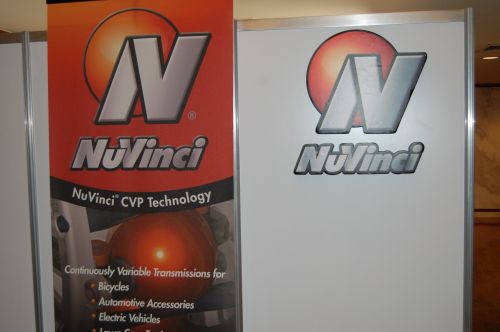TAICHUNG, Taiwan (BRAIN) — Al Nordin is convinced it’s only a matter of time before the market for electric bikes in North America develops into a thriving category. And as the president of NuVinci’s bike division, he has been positioning the company for the past eight years to be ready for the inevitable.
“It’s happening,” Nordin said. “Our goal is to be there early and after and not be late to the game.”
Nordin is here in Taichung talking to product managers about Harmony, an auto-shifting system that works in concert with the company’s N360 hub. Harmony, which is in production now, operates through a speed sensor that sends signals to a sealed motor unit based on rider pedal cadence. With the smooth-turning continuously variable planetary (CVP) hub, the set is an ideal combination for electric bikes, which riders often tend to forget to shift, Nordin said.
Since Eurobike, NuVinci has signed up about 30 OEMs to spec Harmony on 2014 model year e-bikes, including a few European brands that plan to enter the U.S. market. NuVinci also works closely with other suppliers like Gates Carbon Drive, Bosch and FSA to incorporate their products with Harmony and N360. Gates’ belt drive and Bosch’s popular mid-motor e-bike drive system are natural partners for NuVinci’s setup, as is FSA’s Patterson sealed front derailleur.
NuVinci also plans to sell Harmony retrofit kits through its dealer network, as well as offer pre-laced wheelsets with the N360 hub. Nuvinci is also working to adapt its system to the new generation of so-called speed pedelecs hitting the market in Europe. Those e-bikes generally offer up to 45 kilometer per hour pedal assistance powered by a 500-watt motor, however, the NuVinci hub is currently covered under warranty for motors up to 300 watts.
Eight years after first hitting the market under parent company Fallbrook Technologies, NuVinci has steadily inched its way into the market as a viable competitor among internal gear hub suppliers with spec on 200 bike models globally. It’s lower priced than Rohloff or Alfine 11, but is a premium product that is typically seen on commuter bikes retailing at $800 and higher. At 2.4 kilograms (5 pounds) and a few hundred grams more than Shimano’s Nexus 8, the hub isn’t for weight weenies, but “we’re not in the gram game,” Nordin notes. Nordin said the two-wheeled division is self-sufficient, profitable and takes up about 20 percent of company resources. It doubled its business last year and is on track for record growth this year, Nordin added.
Fallbrook has multiple financial investors, including private equity and the 100 original angel investors, but no one entity holds a majority share. It recently licensed its CVP technology to automotive manufacturers Allison and Dana for use in next-generation transmissions designed to increase fuel efficiency, reduce emissions and improve vehicle performance.


